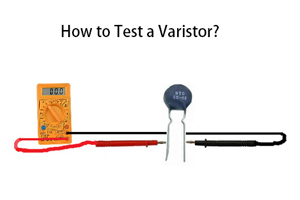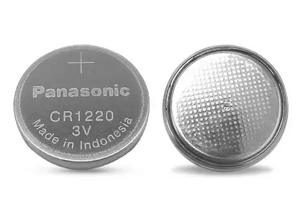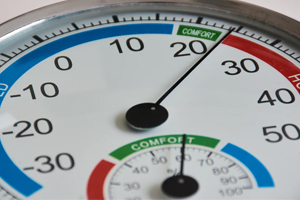CR2 vs CR123 Battery Comparison: Size, Voltage, and Performance
Author:admin Date: 2025-10-22 07:38 Views:227
Introduction
The CR2 and CR123 batteries both have high energy density, making them ideal for many applications. You may have a hard time choosing between the two, since they both excel in performance features. However, several differences might make you choose one over the other depending on the application.
This CR2 vs CR123 battery comparison guide is what you need to understand the differences and choose the right battery.
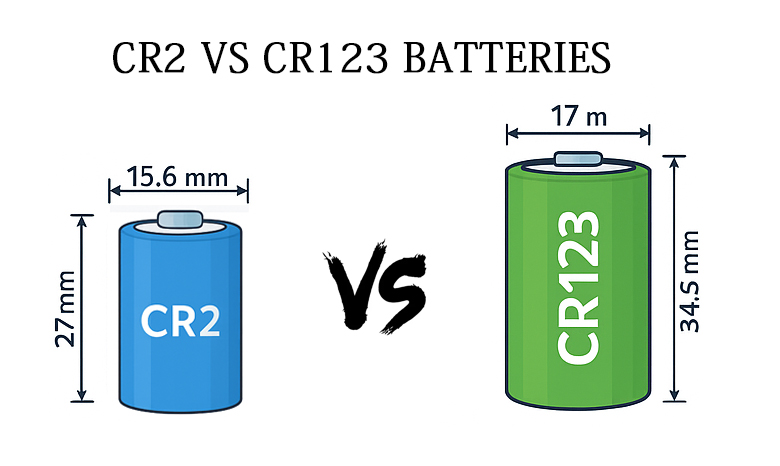
What is the CR Battery Naming System
You might be wondering, what does the term CR mean in the naming of the battery? Well, the letter “C” means that the battery’s chemical composition is lithium manganese dioxide. On the other hand, the letter “R” means that the battery has a round shape.
The naming will also have numbers. The first two digits indicate the diameter in millimeters and the last two indicate the thickness in millimeters.
With that in mind, we can delve deeper into understanding the CR123 vs CR2 batteries.
CR2 Battery Overview
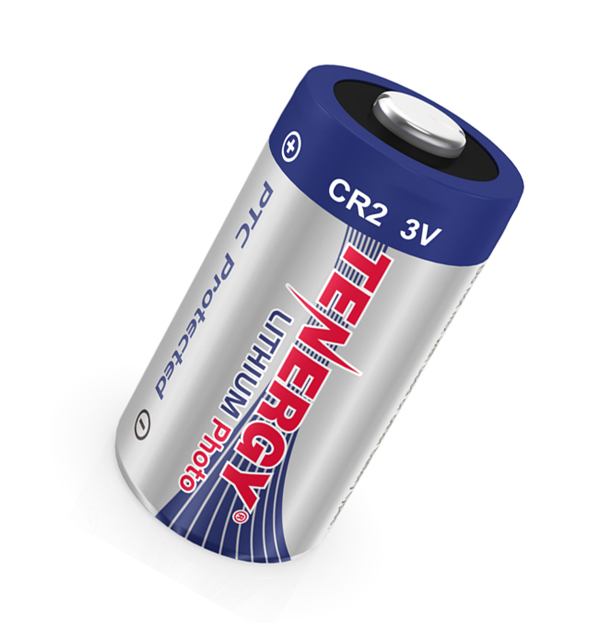
The CR2 battery is a non-rechargeable cylindrical lithium battery with a voltage of 3V and physical dimensions of 15.6mm in diameter and 27mm in height. Having a compact size and stable power supply makes it a good power source for devices such as motion detectors and digital cameras.
| Feature | Description |
| Dimensions | 15.6mm diameter x 27mm height |
| Nominal voltage | 3 volts |
| Chemistry | Lithium manganese dioxide |
| Rechargeable? | No. Single us |
| Capacity | ~ 800mAh |
| Shelf life | Up to 10 years |
| Operating temperature | -40°C to 60°C |
Common Applications
- Measurement and automation: Certain medical tools, home automation devices, laser pointers, and sensors
- Lighting: Small portable flashlights
- Security systems: Smoke alarms and motion detectors
- Photography: Flash units and digital cameras
CR123 Battery Overview
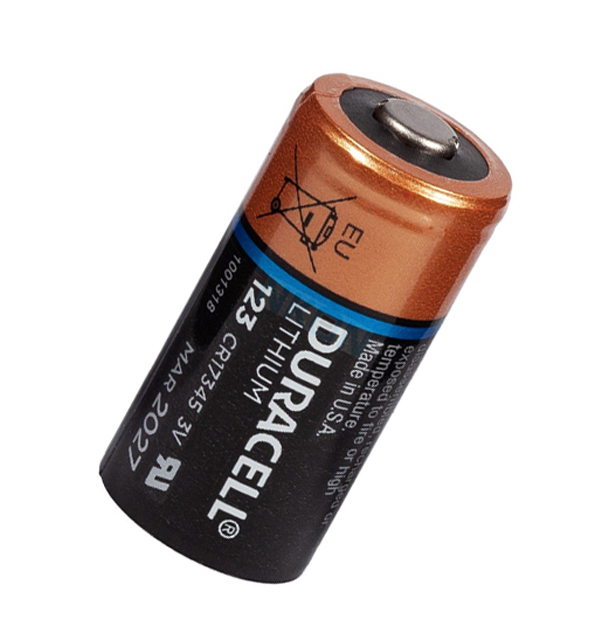
The CR123 battery is a compact but high-performance 3V lithium battery. It has a diameter of 17mm and a height of 34.5mm. You will find it common in flashlights, digital cameras, and security systems because of its high energy density.
The CR123 battery also has a long shelf life and can operate at extreme temperatures. You can also get rechargeable versions, labeled RCR123 or other configurations, depending on the manufacturer.
| Feature | Description |
| Chemistry | Lithium manganese dioxide |
| Nominal voltage | 3 volts |
| Shelf life | Up to 10 years if stored properly |
| Dimensions | 17mm diameter and 34.5mm height |
| Rechargeability | No. Single use |
| Capacity | ~1500mAh |
Common Applications
- Tactical and high-powered flashlights
- Wireless security systems, cameras, and motion detectors
- Tactical and military-grade equipment
- Digital cameras and portable medical devices
CR2 vs CR123 Battery: Technical Comparison
These two batteries differ in multiple ways. It is important to understand how different they are to pick the correct one.
Size and Shape
They both have the same shape, which is cylindrical. However, they differ in terms of size, which determines where they can be used.
The CR2 battery has a smaller diameter and height compared to the CR123. That is why we recommended it for smaller devices with limited space for the battery. Examples include laser pointers and range finders.
The CR123 battery is bigger, which makes it have more energy density. It is able to power devices that draw more power, including high-end cameras, tactical flashlights, and security systems.
Because of the huge size difference, we find that it is not possible to interchange these two. The batteries will not fit in compartments not meant for them.
Voltage Output and Stability
Still on the CR2 battery vs CR123 battery, we have to look at the voltage output and stability. Both batteries are non-rechargeable with a nominal voltage of 3V. This should be good enough for most applications.
Even though both can provide stable voltage supply, the CR123 is better equipped with more energy density to handle the high-current drain applications. It is why this battery can power brighter flashlights as an example.
Capacity and Power Output
Since the CR123 battery has a greater capacity, it means you will end up with a higher capacity and longer runtime compared to the CR2 battery.
The typical capacity for CR2 ranges from 600 to 900 mAh, while that for CR123 ranges from 1400 to 1700 mAh or more.
The runtime largely depends on the device’s power draw. However, it is expected that the CR123 will offer a higher runtime, even in high-drain devices, than the CR2 battery.
Energy Density and Efficiency
The battery chemistry for both batteries is lithium manganese dioxide, known for its high energy density even in small batteries. Although both batteries are non-rechargeable, they still provide good energy densities for their size.
The weight-to-power ratio also shows how the CR123 holds more energy. We find the CR2 battery a more efficient choice for those who want to minimize weight while still achieving the proper energy density.
Performance Comparison in Applications
The two batteries will definitely differ in performance depending on the applications. Below is a quick table showing the comparison.
| Feature | CR123 | CR2 |
| Capacity | ~ 1500mAh | ~800mAh |
| Current draw | Higher voltage to provide more power for the high-drain devices | Lower. Best for low-drain applications |
| Flashlight performance | Best for high brightness and longer runtime | Less suitable for high-brightness applications |
| Camera performance | Works well with professional and high-drain cameras | Used mostly in smaller digital and film cameras |
| Smart home | Used for both low and moderate-drain uses | Works best for compact and low-drain sensors |
| Temperature performance | Good cold-weather performance. It can be used with high-drain devices in extreme cold. | It can still work well in cold weather |
Safety, Storage, and Shelf Life
Batteries come with built-in protections against leakage and over-discharge. We recommend that you do not short-circuit the battery terminals or mix the new and old batteries. This is to ensure the battery is stored or used safely to avoid any issues.
The shelf life of the CR2 and CR123 is relatively the same at 10 years. It is expected that performance will deteriorate over time, especially when batteries are stored in humid conditions or at high temperatures.
We recommend storing the batteries in a cool, dry place away from direct sunlight or heat sources. Also, keep the humidity below 70%. Store the batteries in their original packaging until they are taken out for use.
Conclusion
We have seen that both CR2 and CR123 batteries are suitable for several applications. They might differ in capacity and size, but they all offer good energy density for their respective uses. Make sure you get batteries from top brands if you want the best results. Also, store them correctly when not in use to get good performance still when it is time to start using them.
Please send RFQ , we will respond immediately.
Frequently Asked Questions
Are the CR2 and CR123 batteries interchangeable?
No. They are not. Even though these two batteries have the same voltage rating, their sizes differ significantly. This makes them incompatible with each other’s application.
Which battery lasts longer? The CR2 or CR123?
The CR123 lasts longer because of its higher capacity of around 1500mAh compared to the CR2, which has a capacity of 800mAh.
Do the CR123 and CR2 have the same voltage?
Yes. They both have the same voltage of 3 volts. However, capacity and current delivery differ. Expect the CR123 to maintain its voltage for longer, even when used with high-drain devices.
